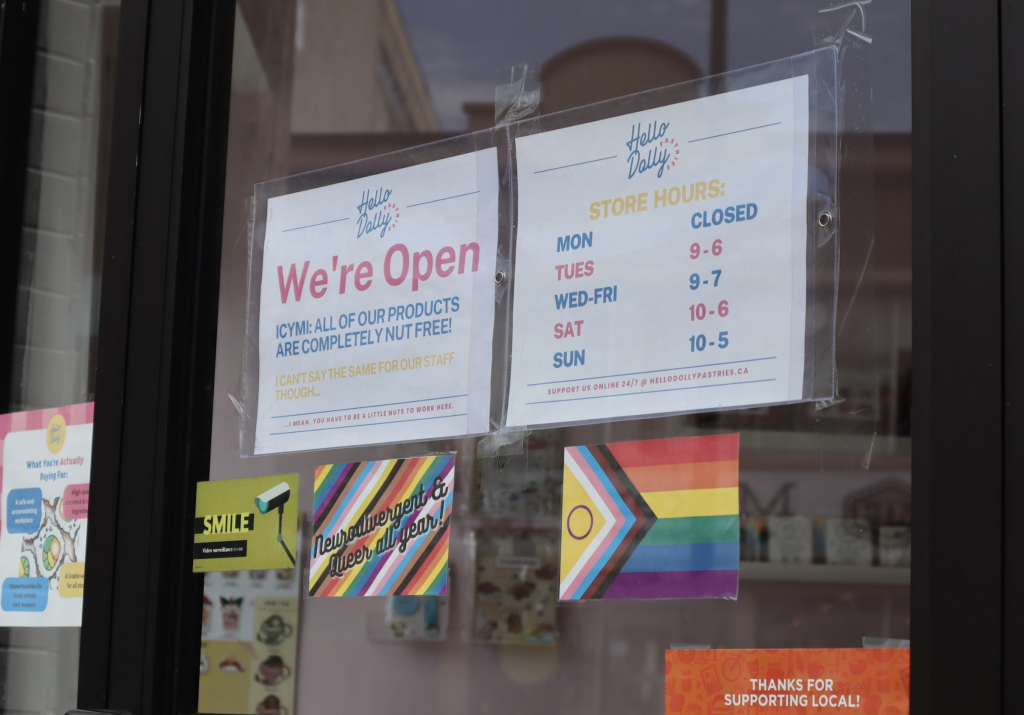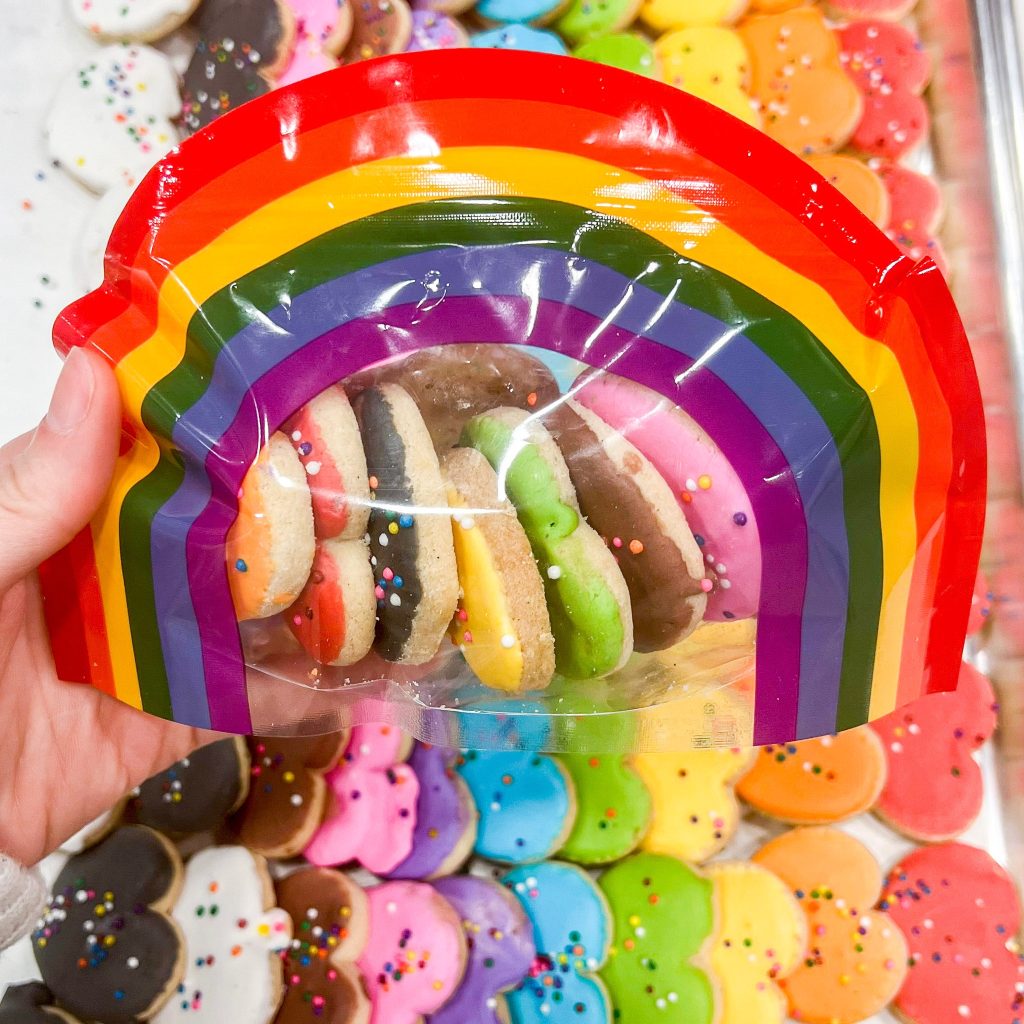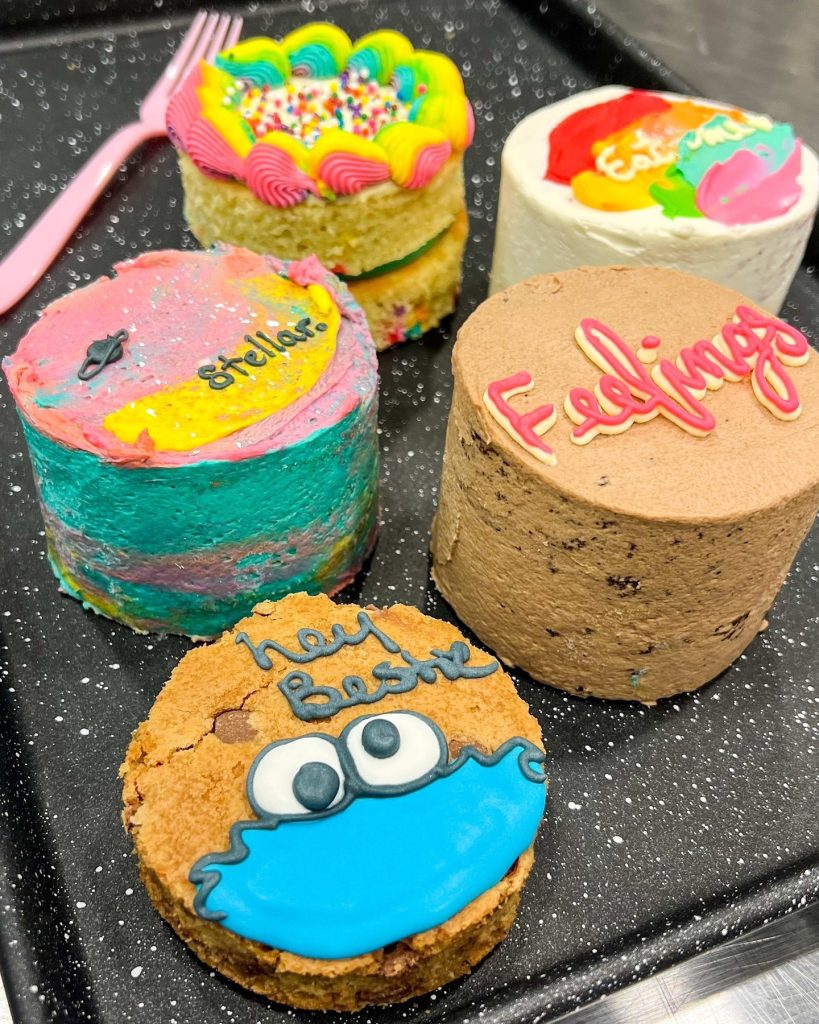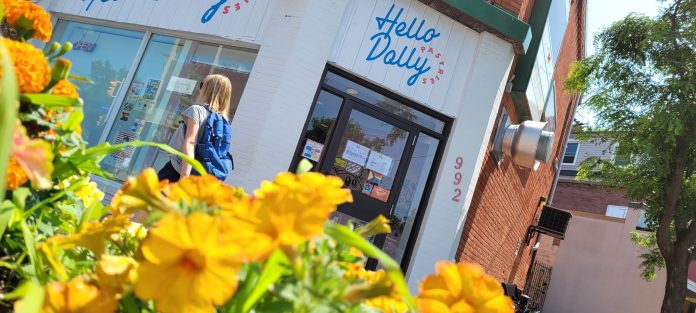By Gabrielle Huston
The owner of Hello Dolly Pastries is proud to boast that their bakery is “neurodivergent and queer all year, not just during Pride.”
A sign on the door attests to that fact, and it can be found proudly displayed all 12 months of the year.
Kourtney Morin (they/them) owns Hello Dolly Pastries at the corner of Wellington Street West and Irving Avenue in Hintonburg. All of their staff are neurodivergent, LGBT+, or both. Though this may seem like a stunning coincidence, LGBT+ individuals may be more likely to be neurodiverse.
Neurodiversity is a term that encompasses individuals whose brains are wired differently than “normal.” As a result, their experience of “sociability, learning, attention, mood, and other mental functions” differs, according to the Canadian Institutes of Health Research.
Attention deficit/hyperactivity disorder (ADHD) and autism spectrum disorder (ASD) are the most well-known neurodiverse conditions, but the term also encompasses those with dyslexia, dyspraxia, dyscalculia, and Tourette syndrome. People who don’t have one of these conditions are known as neurotypical.
Though Morin has known they had ADHD since they were 16, they also realized they had ASD after their son (he/him) was diagnosed with it. Since then, it’s been on their mind almost all the time.
One night, Morin talked to their son and described his tone as “whining.” When he complained that he wasn’t whining, the two of them discovered that his neurodiversity had caused a communication barrier.
“He thought whining was like when dogs whimper,” Morin said. “And I said, ‘no, there’s a certain inflection in your tone when you’re speaking and that’s what we say is whining.’ And he would have never put two and two together because it’s the same tone that the dogs would make, but when you’re speaking. He didn’t understand that that was also whining.”

Morin said they realized that, as neurodiverse people age, they learn more of these implied connections and unspoken rules.
“The problem with being undiagnosed for so long is that I have everyone else’s voice in my head,” they said. “So, when you grow up autistic, you’re trying to learn all the rules, and you can end up masking.”
Masking is a symptom of neurodiversity wherein the person attempts to hide the traits of their condition in some way to appear more “normal” to others. For example, autistic individuals may make facial expressions even when they’re not compelled to, or ADHD individuals might self edit what they say in conversations.
“Anybody who knew me before [being diagnosed with ASD] was like ‘oh, I really liked you,’” Morin said. “No, you actually liked the curated version of myself that I made for you.”
Morin found their LGBT+ identity shared a lot of similarities to their neurodiversity, including the need to present a palatable version of themselves.
“You’re just trying to fit in. It’s pure survival mode, and it’s exhausting,” they said.
According to Sheena Howard (she/her), Morin is not alone in their exhaustion.
Howard is an RN Psychotherapist with more than 20 years of clinical experience. She focuses especially on helping those who, like herself, have ADHD and/or identify as LGBT+.
“If you are in the LGBT+ community and you are also neurodiverse, you pay a lot of attention to everything,” Howard said. “The uniqueness of LGBT+ folks is that I think many of us have had to put a lot of effort into knowing who we are and paying attention to how we exist in the world. We have to learn to do different things to make sure we’re safe. That leaves us open to watching for all different ways of being hurt or harmed or whether we’re going to be accepted. We’re really tired.”
There’s not enough published research yet to make a definite link between neurodiversity in general, or ADHD or ASD specifically, and identifying as LGBT+. Some studies have shown a link between having a neurodiverse condition and identifying as LGBT+, while others have not.
“The stats and evidence are out on it,” Howard said. “But we do have a lot of anecdotal evidence. In many of our practices, we have more than our fair share of folks who are LGBT+ and neurodiverse.”
If there is a clear correlation, it’s still unclear what may prompt an individual to be both neurodiverse and LGBT+. However, Howard has her own theory.
In investigating the data for a possible connection, Howard said she was “fascinated with the ways in which our neurological wiring gets hardwired. The pathways for sexuality and gender are similar to the pathways for neurodiversity.”
Howard believes neurodivergent LGBT+ people have a “hereditary predisposition to curiosity” and that the neurological pathways formed when individuals have to assess their own gender, or are able to identify patterns in the world with ADHD, “lock in opportunities and diversity.” In layman’s terms, they keep an open mind.
Morin echoed this sentiment.
“Neurodivergent people can have an overwhelming sense of empathy,” they said. ”A lot of people think that people that are neurodivergent lack empathy and don’t care about others. The truth of it is we actually have to force ourselves not to get too involved because we do take on others’ energies and we can feel it in our soul. We have to put up those blockers because, otherwise, it’ll completely consume us.”
Morin said they are happy to live in a neighbourhood that, by and large, has been immensely supportive of their decision to open Hello Dolly Pastries.


They started selling baked goods out of their home as a way to pay for their son’s therapy bill, which was $300 a week and not covered by the province. When the pandemic hit and their son needed one-on-one support, they had to quit their office job.
“The community around here was so overwhelmingly supportive of us, our story, everything like that,” Morin said. “Everyone was asking ‘when are you going to have a storefront? I want to come and buy cookies.’ Then, last fall, I ended up opening the doors to let people shop, and our hours were just ‘whenever I’m here’ because I was a one-person show back then. And I have never felt so much love from the community. Hintonburg’s been way more than anything I ever could have asked for.”
